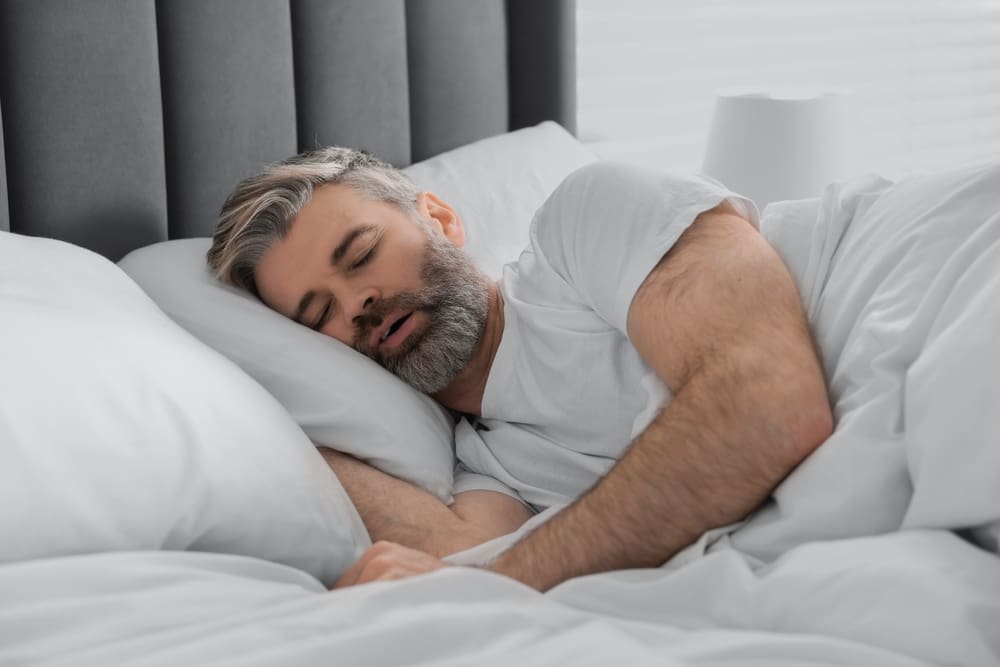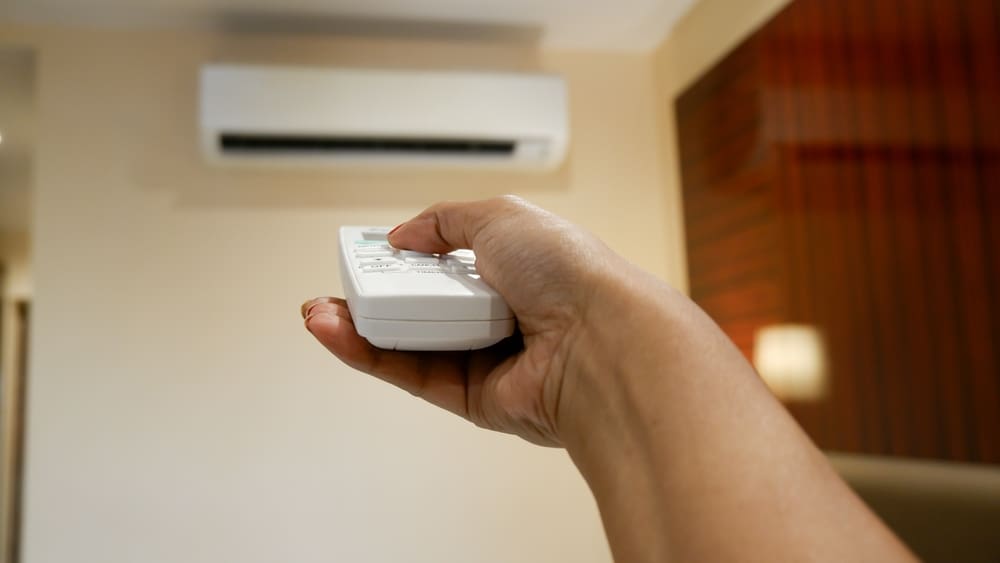
There’s nothing worse than tossing and turning all night because your bedroom is too hot or too cold. The temperature in your room plays a major role in your sleep cycles and overall sleep quality. Setting your air conditioner to the right level can make all the difference in how well you rest.
So, what is the best AC temperature for sleeping?
In this article, we’ll break down how temperature affects your sleep and share expert tips for setting your AC to stay cool, comfortable, and well-rested. Whether you’re a light sleeper or just looking to upgrade your nighttime comfort, better sleep starts with smarter cooling choices.
How Temperature Affects Sleep Quality
Our bodies follow a natural cycle called the circadian rhythm. This controls when we feel awake and when it’s time to sleep. One big part of this cycle is how our body temperature changes throughout the day.
Normally, your core body temperature drops slightly when it’s time to sleep, helping you fall asleep faster and stay in deep sleep longer.
If your room is too warm or too cold, however, it can throw off this natural temperature drop. That leads to restless nights, more wake-ups, and feeling tired in the morning.
Here’s how temperature impacts your sleep:
- Body temperature regulation: Your body cools down as part of the sleep cycle. If your bedroom is hot, this process is harder, and sleep quality lessens.
- Disrupted sleep stages: Deep sleep and REM allow your body to repair itself. But, they only work best when your body temperature is low. A room that is too hot or too cold reduces body recovery.
- Increased wakefulness: Overheating or shivering during the night wakes you up more often, reducing overall sleep quality.
Experts find that the ideal bedroom temperature helps your body drop about 1-2 degrees Fahrenheit from your daytime average. This supports its natural rhythm and allows it to fully restore itself for the next day.
The Ideal AC Temperature for Sleeping
While everyone’s core temperature varies, the National Sleep Foundation generally recommends that the best AC temperature for sleeping is between 60 and 67 degrees Fahrenheit. This temperature range supports your body’s natural cooling process, helping you stay comfortable throughout the night.
Keep these points in mind:
- Temperatures below 60°F may cause shivering or discomfort, which can disrupt your sleep.
- Maintaining a steady temperature throughout the night helps prevent sudden wake-ups.
- Using a programmable thermostat to maintain a consistent bedroom temperature is especially useful, especially in Las Vegas, where summer nights can still be warm and dry.
Many Las Vegas homeowners find that setting their AC between 65 and 67 degrees offers the perfect balance of cool comfort without driving up energy costs. Since comfort preferences differ, feel free to adjust slightly within this range to find what works best for you.
If your AC isn’t maintaining a steady temperature or needs servicing, the experts at BEST Air Conditioning Plumbing Repair are ready to help.
Is There a Different Ideal Temperature for Children and Babies?
When it comes to kids and babies, the best air conditioner temperature for sleeping is usually a little warmer than it is for adults. According to the American Academy of Pediatrics, maintaining a slightly warmer sleep environment for infants promotes safer, more restful sleep.
Experts recommend keeping rooms for infants and kids between 65 and 70 degrees Fahrenheit. This warmer range helps keep your little ones safe and reduce overheating, which can increase the risk of Sudden Infant Death Syndrome (SIDS) in babies.
For older children, sticking closer to the adult range of 60 to 67 degrees is generally fine, but many parents find that 65 to 70 degrees offers a good balance of comfort and safety.
Here are a few tips for parents to consider:
- Dress babies in light, breathable sleepwear and avoid heavy blankets.
- Use a room thermometer to regularly monitor the nursery’s temperature.
- Keep cribs away from direct air vents to prevent drafts or cold spots.

Should You Adjust the AC Temperature by Season?
Adjusting your AC temperature with the seasons can make a big difference, especially in Las Vegas, where scorching summers and cooler winters create unique indoor comfort challenges.
In summer, most people set their AC between 65 and 67 degrees at night. This range offers relief from the heat while helping your system run efficiently.
In winter, your cooling needs change. It’s helpful to turn the AC off completely, raise the thermostat slightly to avoid cold air, or use heating or a humidifier to create a cozy sleep environment.
Here are a few seasonal sleep tips:
- Summer: Use the 65–67°F range for sleep comfort and energy savings
- Winter: Add gentle heat and humidity to stay comfortable.
- All year: Keep your HVAC system maintained for consistent indoor temps
By adjusting your thermostat with the seasons, you’ll enjoy better sleep and a more comfortable home year-round.
Signs Your Room Is Too Hot or Too Cold for Good Sleep
If you’re waking up tired even after a full night’s rest, your bedroom temperature could be the problem. An environment that’s too hot or too cold can interrupt your body’s natural sleep cycle and leave you feeling unrested.
Common signs your room may not be at the right temperature include:
- Waking up feeling tired or not well-rested
- Night sweats or feeling clammy
- Waking up frequently during the night
- Feeling cold, even with blankets
- Snoring or nighttime breathing issues
- Restlessness or constant tossing and turning
- Trouble falling asleep or staying asleep
If these symptoms sound familiar, try adjusting your thermostat to the best AC temperature for sleeping, between 60 and 67°F. You can also use a ceiling fan or set your AC to fan mode to improve airflow and keep the temperature steady throughout the night.
Why Sleeping in a Room That’s Too Hot or Too Cold Is Bad for You
Sleeping in a room that’s either too hot or too cold can seriously disrupt your natural sleep cycle. When your body temperature doesn’t drop the right way, it affects how deeply you sleep and how rested you feel the next day.
Extreme heat can cause sweating, restlessness, and even dehydration. On the other hand, a room that’s too cold might make you shiver, leading to frequent awakenings.
Poor temperature control can also increase stress hormone levels, which interfere with sleep quality. Over time, this can affect your overall health by weakening your immune system and increasing risks for heart disease and mental health issues.
To protect your sleep and health, aim to keep your bedroom within the recommended temperature range of 60 to 67 degrees Fahrenheit.
Fan Mode, Thermostat Settings, and Air Circulation at Night
How you set your AC’s fan and thermostat can significantly impact your sleep comfort.
Most thermostats offer two main fan settings: “Auto” and “On.”
- Auto mode: The fan runs only when the AC is actively cooling. It saves energy but may result in uneven airflow.
- On mode: The fan runs continuously, keeping air circulating even when the AC isn’t cooling. This helps maintain a consistent room temperature but may dry out the air over time.
If “On” mode makes your room feel too dry, try using ceiling fans or portable fans for added circulation without over-drying the air.
Even quiet airflow also depends on having efficient ductwork and a well-maintained HVAC system. Poor airflow or uneven cooling can lead to hot or cold spots that interrupt your sleep. Professional thermostat services and AC maintenance will ensure your entire HVAC system is at peak performance for better rest at night.
Indoor Humidity and Sleep
Humidity levels also play a big role in how well you sleep. Even if you’ve set the best air conditioner temperature for sleeping, the wrong humidity can still make your room feel uncomfortable.
Too much humidity makes the air feel sticky and heavy, leading to night sweats and restless sleep. And, too little humidity can dry out your skin, irritate your sinuses, and cause scratchy throats that interrupt rest.
In a dry desert climate like Las Vegas, many homes experience low indoor humidity, especially when the AC runs a lot. Adding a humidifier can help balance the moisture level and improve sleep quality. And, if your home feels damp or musty, a dehumidifier might be necessary.
Best Air Conditioning Plumbing Repair offers indoor air quality testing and can recommend the right humidifiers or dehumidifiers to create a sleep-friendly environment.
Why Choose Best Air Conditioning Plumbing Repair for Better Nighttime Comfort
If you’ve ever wondered, “What should I set my AC to at night?”, you’re not alone. And, having the right HVAC team on your side makes all the difference.
At BEST Air Conditioning Plumbing Repair, we help Las Vegas homeowners find the best air conditioner temperature for sleeping and keep their systems running at peak performance.
Our licensed HVAC technicians are well-versed in the region’s desert climate. Whether you need a simple tune-up, an AC upgrade, or urgent AC repair, we’re available 24/7 with honest service and fast response times.
Call Us Now for AC Help That Supports Your Sleep
A good night’s sleep starts with the right temperature, and that means having an AC system you can count on.
If you’re unsure what you should set your AC to at night, or if your system struggles to keep up, BEST Air Conditioning Plumbing Repair is here to help.
From AC repair and air conditioning replacement to thermostat upgrades and maintenance, our team is ready to keep your home cool and comfortable, day and night.
FAQs About AC and Sleep
1) Can sleeping in cold air make you sick?
Sleeping in cold air doesn’t directly cause illness, but extreme cold can weaken your immune system if you’re exposed for too long. Keeping your bedroom in the recommended range (60–67°F) helps avoid discomfort without risking your health.
2) Is it OK to leave the AC on all night?
Yes, leaving your AC on all night is okay if it’s set at the right temperature and your system is in good condition. Using “Auto” fan mode helps save energy while maintaining comfort.
3) What sleep temperature is best for older adults?
Older adults often prefer slightly warmer temperatures, around 65–70°F, due to changes in body temperature regulation as they age.
4) What’s the difference between sleep mode and regular AC mode?
Sleep mode adjusts temperature gradually throughout the night to save energy and improve comfort. Regular AC mode maintains a constant temperature.
5) How do I keep my room cool if my AC is too small?
You can use fans, close blinds during the day, and improve insulation. For long-term comfort, consider upgrading your system with BEST Air Conditioning Plumbing Repair.

